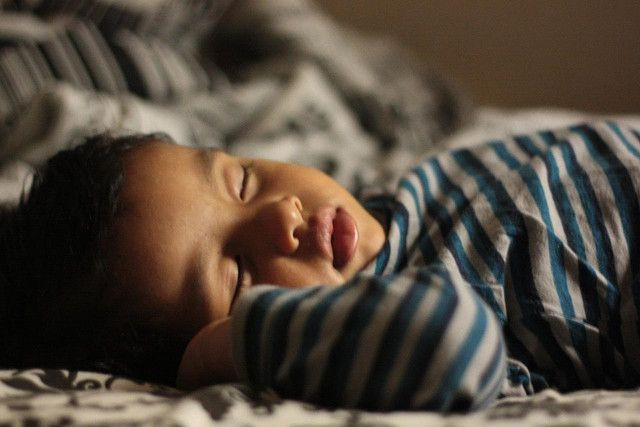The Amount Of Sleep You Get Doesn't Matter; It's Uninterrupted Sleep That Affects How Happy Or Angry You Are

You've probably heard countless health experts say that depending on your age seven to eight hours worth of sleep is best to ensure you’re alert and capable of functioning the next day. But while sleeping too much or too little can be detrimental to your health, the quality of your sleep also has an impact on how you feel the next day. As it turns out, your nightly bathroom rendezvous may have more of an effect on the way you feel than the number of hours you sleep.
A new study from Johns Hopkins University, published in Sleep, found people who wake up multiple times over the course of a night are more than likely to have sour moods the next morning — even more so than those who sleep for only a few hours without interruption. These findings were the result of a three-night experiment in which 62 healthy men and women were split into three groups: One had interrupted sleep, another had a delayed bedtime, and the last slept through the night without interruption.
During each night, the participants whose sleep was interrupted were awoken eight times, while those who had a delayed bedtime ended up getting shorter amounts of sleep. All three groups rated their moods in a questionnaire that assessed positive and negative emotions — cheerfulness or anger, for example — the next morning. The researchers found that by the second night, both forced-awake and delayed-bedtime participants started to show drops in their positive moods and upticks in negative emotions — 31 percent and 12 percent, respectively. There were no significant differences, however, when it came to overall changes in negative moods during the entire three-day experiment. This suggests that interrupted or delayed sleep had more of an effect on positive mood than negative mood.
"When your sleep is disrupted throughout the night, you don't have the opportunity to progress through the sleep stages to get the amount of slow-wave sleep that is key to the feeling of restoration," said lead author Dr. Patrick Finan, an assistant professor of psychiatry and behavioral sciences at the Johns Hopkins University School of Medicine, in a press release.
Compared to the delayed-bedtime group, the forced-awake group had shorter periods of deep, slow-wave sleep. Normally referred to as “deep sleep,” slow-wave sleep is the third stage of non-rapid eye movement sleep — a sleep state in which sleepers rarely dream — where brain and muscle activity decrease significantly, allowing our bodies to recover from the day. Without these effects, forced-awake participants felt more negative, and had lower levels of energy, sympathy, and friendliness.
Although the study was conducted on healthy patients with normal sleep schedules, Finan said the results could be applied to those who suffer from insomnia. Frequent awakenings over the course of the night is one of the most common symptoms of insomnia, which affects an estimated 10 percent of the U.S. adult population. "Many individuals with insomnia achieve sleep in fits and starts throughout the night, and they don't have the experience of restorative sleep," Finan said.
While the results certainly show positive mood can be affected by interrupted sleep, Finan said more research will be necessary to learn about the role of a restorative night’s sleep, as well as the sleep stages people with insomnia experience.
Source: Finan P, et al. Sleep. 2015.



























